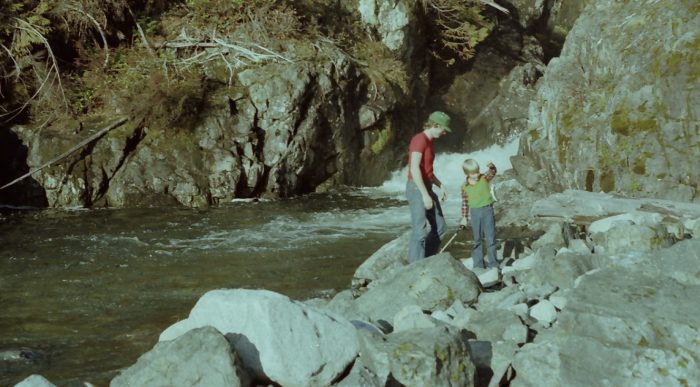A group of boys was milling about on the path by the edge of the canal.
As my wife and I walked closer, we could see their arms swinging and the arc of their fishing poles as they cast their lures into the ribbon of water in the concrete trench.
We came across a piece of fishing line and a pair of scissors in the dirt, which we picked up and carried over to them. Too cool for school, the pack eyed us up with faces on the sullen side of neutral.
“Make sure you pick up any loose line,” my wife said. “Yesterday I found a bunch of line with a big hook on it. People walk their dogs along here and a hook in the paw would be nasty.” As if to accentuate the point, our elderly mutts strained on their leashes to sniff the boys, their bait container, and arsenal of tackle.
“That wasn’t ours!” said one kid breaking from the silent ranks. “We don’t use plain hooks.”
“Well,” my wife said, holding out the scissors and loops of line, “are these yours?”
Silence and a nod. My wife tried to lighten up the conversation and asked if they had caught anything. Yes, they had caught a big “catfish” and, finally breaking their cool façade, they excitedly showed us the pictures on their smartphone.
As we walked away, I mentioned to the boys that in the spring we had helped rescue two geese from the nearby pond. Both geese had hooks caught on their legs and the line had wrapped around and cut off circulation to their feet. Neither of them survived.
The boys had gone back to fishing, and between their earbuds and taking cues from the pack leader, I had the sense that my old man words may have floated right on by like the pieces of bread they tossed in the canal to draw in the fish.
When we turned around to walk home, the boys passed us on a convoy of bikes, pedalling or standing on the rear-wheel pegs, fishing poles sticking out of their packs. Off they went, without eye contact or a word, just the odd snicker as we wished them a good evening.
Even from a distance, we could see that they had left a mess. Rubber gloves. Water bottles. Bread bag. Fishing line. A rubber lure with shining hooks sticking out of the dirt. We felt our faces flush with anger as we gathered the debris and carefully scoured the area for any more hooks. The two quarters and a dime they left behind in the dust were small consolation.
Throughout much of my life, there was little I loved more than to fish. “Just one more cast?” I can remember asking Dad, Mom, or Grandma a million times as they tried to coax me from the edge of the murmuring creek or shore of the lake where waves lapped the waterlilies and sedges. One more cast, one more attempt to entice an iridescent trout from below the waves, to bring it flopping onto shore to be clumsily dispatched and cleaned for dinner.
To have grown up in an area dotted with lakes, from potholes to roaring inland seas is a blessing I still treasure. As I type these lines, I can hear the hum of mosquitoes and smell the peppery vegetation along the lake margins. I can hear the laugh of the loons and see the splash of an osprey hitting the water. These majestic northern fishers still hold me in thrall even though my own fishing days are over.
We had seen two of the boys a couple of days earlier. They were fishing near the same spot with a man—maybe a father, uncle, or family friend. I was never a track star, or a basketball player like my father was when he was younger. I was a geeky, clumsy, sensitive kid. But fishing was something in common that brought me and Dad together.
I was proud of the man for taking these two boys out. Away from the screens, out in the fresh air on a weekend afternoon. There was so much wrong and sad about the scene: reclaimed water mixed with flow from rivers long since choked behind dams. Imported, sterilized carp gaping and mouthing the algae along the concrete walls. Like fishing in a bathtub filled with goldfish. But in that moment I could overlook all the wrongness and focus on the human connection.
Later, when I saw the garbage, the hooks and line strewn about by the boys on their independent outing, I could see the missing piece of the lesson: respect. Respect for others. Respect for the land, water, and all manner of creatures. For as much as fishing with my father was about choosing the right lure and weight, it was also about leaving things better than we found them.
>> Not our can? Who cares, it shouldn’t be there. Let’s pick it up.
>> Did we bring everything out that came in with us?
>> Did we stack the leftover firewood in the shelter of a spruce tree so the next fisher on a cold, rainy day will appreciate it?
They were lessons lived, not abstractions.
As my wife and I finished cleaning up the mess, we shared our hopes that the boys get more of these lessons as their prefrontal cortices struggle to develop on the long road to adulthood. We hoped that the followers in the group who felt a little guilty would grow stronger in their convictions and learn to march in the direction of their ethics.
Maybe critical thinking would bring them to question the logic of respecting creatures we then try to kill and eat. If that means they hang up their fishing pole someday, may they still feel love, support, and a shared bond in the non-consumptive joys of nature.
Nature, even and especially in our beleaguered urban landscapes, needs all the love she can get–just like growing boys.









Read 2 comments and reply